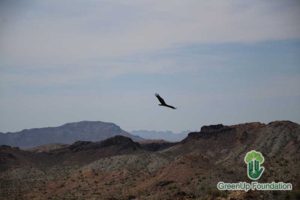Informing about the valuable and essential services this bird provides to us and to the environment.
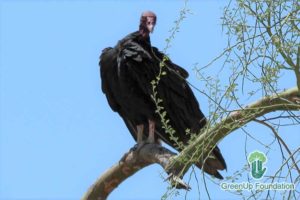 Vultures probably prevent the spread of disease. In one study in which vultures were fed disease-causing organisms, including anthrax, it was found that most bacteria were killed in the vultures’ highly acidic stomachs. In essence, vultures eat and sterilize contaminated meat.
Vultures probably prevent the spread of disease. In one study in which vultures were fed disease-causing organisms, including anthrax, it was found that most bacteria were killed in the vultures’ highly acidic stomachs. In essence, vultures eat and sterilize contaminated meat.
The majority of wild mammals do not succumb to predators. Instead, they die from diseases, starvation, parasites, fights over mates, competition, accidents, or some combination of these. Vultures excel at finding and eating these animals.
In the absence of vultures, rotting meat would be consumed by other creatures that many humans find undesirable, such as maggots and bacteria. Most people would prefer one vulture over thousands of bacteria or several pounds of maggots.
Vultures are a fascinating example of a scavenging way of life. Did you ever notice how there are no mammals that are exclusive scavengers? Scavenging is truly a lifestyle for the birds. This is because a successful scavenger must be able to cover extensive ground in search for food. Mammals simply can’t cover enough ground, while using minimal energy, as can birds that use energy-efficient soaring flight. Moreover, scavengers in flight can view large areas at once and also keep their eyes on other scavengers, who may descend and lead them to a meal. Vultures are one example of a group of animals evolving fascinating adaptations to exploit a new niche.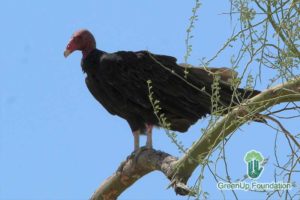
Many people enjoy watching the seemingly effortless flight of vultures.
Vultures have played important roles in several human burial practices around the world. In deserts, or areas with rocky soils or insufficient fuel for cremation, disposal of human remains by vultures may be the best and cleanest option.
Without vultures to efficiently remove large amounts of decaying meat, both air and groundwater would show increased contamination.
Some of the larger vultures, like California and Andean condors, have wing spans around 10 feet, and are truly impressive to behold.
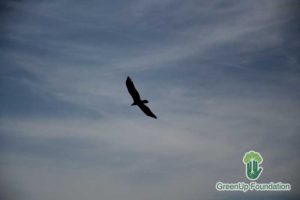
Many vulture species around the world live closely associated with human societies. These vultures feed at garbage dumps, livestock facilities, and in streets, removing human-caused waste that would otherwise take up more space in landfills and possibly spread disease.
In some agricultural regions, vultures aid farmers by disposing of deceased livestock and saving farmers the trouble of doing so themselves.
The turkey vulture’s powerful “nose” has been used to human advantage. Congregating turkey vultures have indicated the location of natural gas leaks to company personnel (because the vultures are attracted to the gas mercaptan, which is put into natural gas for safety reasons and smells like decaying meat), and some people are looking into using the turkey vulture’s sense of smell to aid searches for missing people.
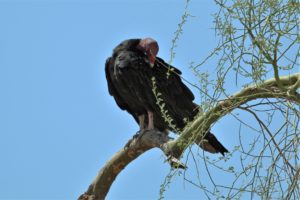
Some scientists believe vultures in Africa were important to early hunter-gatherer humans. The idea is this: early humans, often in need of food, and especially high-protein food such as meat, were able to follow descending vultures to carrion and a free meal.
